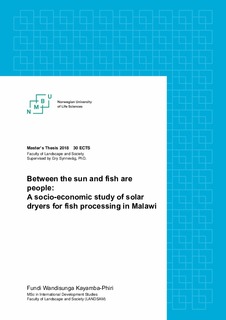| dc.contributor.advisor | Synnevåg, Gry | |
| dc.contributor.author | Kayamba-Phiri, Fundi Wandisunga | |
| dc.coverage.spatial | Malawi, Nkhotakota | nb_NO |
| dc.date.accessioned | 2018-10-11T09:13:04Z | |
| dc.date.available | 2018-10-11T09:13:04Z | |
| dc.date.issued | 2018 | |
| dc.identifier.uri | http://hdl.handle.net/11250/2567586 | |
| dc.description.abstract | This study examined how the usage of solar tent dryers had improved the livelihoods of fish processors in Chipala and Vinthenga villages in Nkhotakota, Malawi. The study used the sustainable livelihoods framework to analyse the findings. A mixed methods research design was employed in the study. For the qualitative data, a thematic analysis was used; and for the quantitative data, inferential and descriptive statistics were used such as logit regression modelling and t-tests. The solar tent dryers have improved fish processing; however, the impact of the dryers is minimal and not well accounted for. Some key sustainability measures were lacking and therefore posed a threat to the continued use of the method. The logit regression model indicated that the location (village) of a fish processor was the only determining factor for participation in solar tent drying activities. Adoption increased as the fish processors realised that the method reduced their time and energy spent whilst processing fish. However, lack of space in the dryer meant that increases in adoption limited the impact of the dryer on income. Adoption was directly affected by poor governance; a top-down approach employed by different stakeholders. Women were involved in all activities in the fisheries value chain except for catching fish, which is restricted to men. Gender roles and perceptions affected the socio-economic status of fish processors, as gender equality was contextualised as a monetary responsibility shift to women who were involved in fish processing and other enterprise. All factors considered, the solar tent dryers have had insignificant impact on the livelihoods of fish processors. The project would have benefited from an interdisciplinary approach, where fish processors were the central focus of the intervention, to ensure that the outcome was sustainable livelihoods. | nb_NO |
| dc.language.iso | eng | nb_NO |
| dc.publisher | Norwegian University of Life Sciences, Ås | nb_NO |
| dc.rights | Attribution-NonCommercial-NoDerivatives 4.0 Internasjonal | * |
| dc.rights.uri | http://creativecommons.org/licenses/by-nc-nd/4.0/deed.no | * |
| dc.subject | Lake Malawi | nb_NO |
| dc.subject | Solar tent dryers | nb_NO |
| dc.subject | Sustainability | nb_NO |
| dc.subject | Governance | nb_NO |
| dc.subject | Nkhotakota | nb_NO |
| dc.title | Between the sun and fish are people : a socio-economic study of solar dryers for fish processing in Malawi | nb_NO |
| dc.type | Master thesis | nb_NO |
| dc.description.localcode | M-DS | nb_NO |

